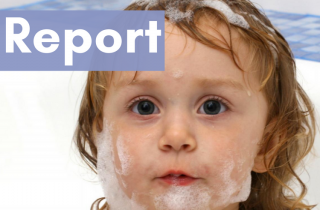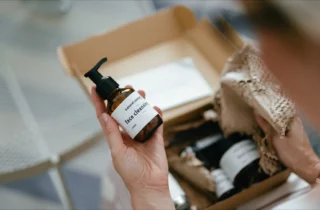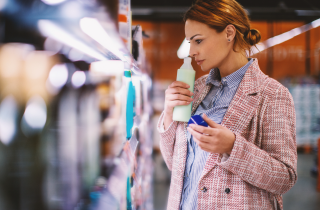Endocrine Disruptors: Behind the Science Ep. 2
Featuring Sarah Janssen, Ph.D.
Staff Physician, Kaiser Permanente, Assistant Clinical Professor, Occupational & Environmental Medicine, UCSF, and BCPP Science Advisory Panel member.
Episode 2: Endocrine Disruptors
Explore topics like:
- What are endocrine disruptors or EDCs?
- Where are we exposed to EDCs?
- What is so bad about flame retardants?
- How can we reduce our toxic exposures?
- What are chemicals of concern for breast cancer?
- Why should we be concerned about chemical exposure?
Video Transcription
[00:00:48] An endocrine disruptor is a chemical that mimics the hormones, such as estrogen or progesterone, the reproductive hormones or testosterone, which is a male reproductive hormone, and thyroid hormone which is really important for development of the brain and nervous system.
[00:01:06] Some chemicals in the environment in particular flame retardants, plasticizers, like phthalates and BPA, have been shown to be endocrine disrupting substances and are interfering with healthy reproduction, healthy brain development, and in some cases have been linked to different kinds of cancer including breast cancer. We are exposed to endocrine disruptors in our daily lives through the food we eat, the water we drink ,and especially in our house dust. House dust can be inhaled or if you touch something that’s dusty and then put your hands near your face or your mouth you can be ingesting chemicals that way. So one of the biggest ways you can reduce your exposure is to wash your hands. With just plain soap and water.
[00:01:59] People hear flame retardant and they think that’s a good thing. They think it’s keeping them safe from fire but flame retardants don’t actually work to either keep the fire from happening or to give you enough time to get out. What they do is expose you to a lot of chemicals that haven’t been adequately tested when they have there’s a lot of concerns about their health effects and their abundant in our environment and in our homes.
[00:02:30] Other ways you can reduce exposure to chemicals in your home including endocrine disruptors is to leave your shoes at the door, avoid microwaving in plastic. Eat organic foods. And as much as possible eat fresh foods not canned foods.
[00:02:51] There are a number of chemicals of concern that are linked to breast cancer and some of them are known carcinogens. Things like benzene which is a gasoline additive is present and auto exhaust fumes. Ethylene oxide which is a disinfectant often used for sterilizing hospital equipment and ionizing radiation which we can be exposed to when we get x rays or through airline travel.
[00:03:19] Other chemicals of concern that are linked to breast cancer or endocrine disrupting substances that might cause an earlier onset of puberty, longer time for breast development and growth or chemicals that interfere with breast development and growth especially during times when the breast is rapidly changing such as during puberty during pregnancy or during lactation.
[00:03:46] Some of the endocrine disruptors that have been linked to breast cancer include things like phthalates which are used in a lot of fragrances and personal care products BPA or bisphenol A which is often found in food. And some of the other chemicals like flame retardants, prefluorinated chemicals which are used in nonstick cookware and water and stain repellent products as well as pesticides which have also been linked to breast cancer.
[00:04:24] So while people may be living longer as a whole we also have increased rates of infertility especially in younger couples and increased rates of childhood cancer and increased rates of learning disabilities and so people might be living longer but they’re living with a lot more conditions and diseases that we didn’t see in these numbers previously and so it really does make a difference to reduce our exposure to the chemicals that have been linked to these conditions which makes our quality of life better not just the length of our lives.
Donate
Support BCPP’s work to prevent breast cancer and save lives by uncovering the hidden scientific links between breast cancer and the environment.
Types: Video




